#traditional catholic prophecies
Text
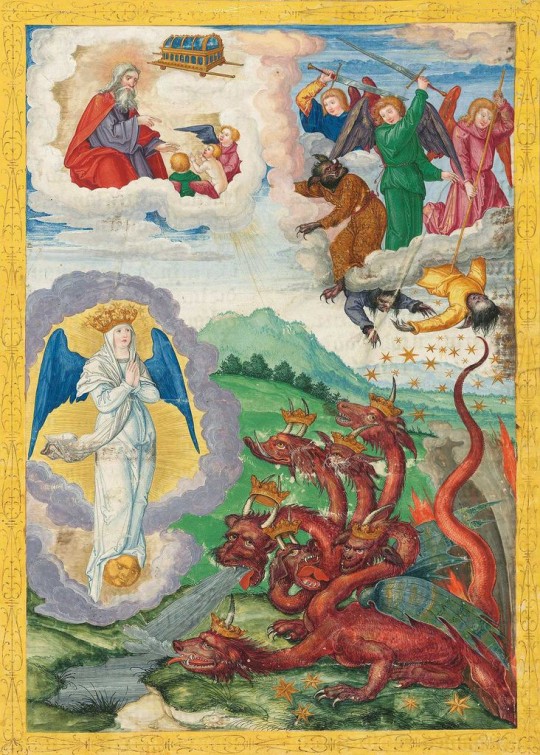
A medieval Catholic religious art image from the book of Apocalypse. Artist unknown.
#traditional catholicism#traditional catholic images#middle ages catholic religious art#the catholic bible#traditional catholic prophecies#the new testament#the book of apocalypse
88 notes
·
View notes
Note
I'm always here for one of your 🌶️ Wheel of Time takes.
Heh. Then I shall not disappoint!
I think that while some of the criticisms folks have of the gender stuff in WoT is valid, a lot of the things people cite as objective facts/proof of Robert Jordan being a secret misogynist, is actually a case of people conflating the views and biases of Jordan's characters with his own beliefs.
One day I want to sit down and do a longer meta on the One Power, it's mythological roots, it's place in the WoT cosmology, and it's societal impact- and what the way it's written actually says about the vision of gender and sex the series presents vs what people think it says (hint: the series is not nearly as gender essentialist as folks like to claim). But for the moment I'll confine myself to this: Jordan presents the idea that, inherently, people are people first and foremost, and no singular flaw or virtue is confined to one gender, one nation, one people group, even one side of the good vs evil conflict.
Many of the same flaws that dogged male-dominated historical institutione that emphasized a higher mission, privileged tradition and entrenched power in certain closed off ways (such as the Catholic church), also dog the White Tower. Many of the foundless prejudices the patriarchy foists onto women ('they gossip to much', 'they can't be trusted with power', 'they need someone to keep them in check and on the Right Path', 'their soft hearts can't handle rough treatment') Jordan's world foists onto men just as easily- with different justifications and reason, but still as ultimately baseless. Any time someone makes a sweeping gender based judgement- the narrative almost immediately undercuts it, when it doesn't outright draw attention to the speaker being wrong (even the qoute-on-qoute 'world wise' characters like Thom deal with this).
People in Jordan's world believe that gender matters and matters a whole lot- but that belief is a self fulfilling prophecy. Virtues and flaws, sins and triumphs, victories and defeats- their all agender in Jordan's world. It's the character's belief that these things are gendered, born of their prejudices and biases, that make it seem like Jordan is making the opposite statement, when really what he's doing is asking you to think critically of yourself, and try to suss out where a character is coloring their own narrative to suit themselves, and where they aren't.
#I could keep going but I'll leave it here#before I just start listing off various tragic or awesome moements int he series by turns and how their pretty evenly spread by gender#wot#wot meta#the spicy take zone#wheel of time
91 notes
·
View notes
Text
The Passion Of Jimbriel
Part 1: The Entry into Soho
The story of events leading up to the crucifixion of Jesus, and the days following, until his ascension to Heaven, are collectively known as the Passion narratives. It comes from the Latin "to suffer," or "to endure."
More than one op has mentioned there are parallels to this in S2, so I thought I would try and find how well the whole narrative was followed. Oh yes, is the short answer, it certainly does! And how! And in places you might be surprised about. I hope this series of metas might answer some of the odd mysteries of "why is that there...? that are still floating around at the moment for you.
I've tried to match the narratives to scenes and incidents in S2 as closely as I can, but I only have sketchy Anglican Christian background, so if you have had a more thorough Catholic upbringing than me and see something I have missed, slip me a message and I'll do my best to edit things.
A word of warning before we start - it's not a linear match-up. I'm planning to run through the traditional sequence of the Passion in order, but will match with the S2 scenes as needed, and those are scattered back and forth in time. It's Catch-22 again - everything thrown up in the air and landing at seeming random places, where ever they seem to fit best for the narrative.
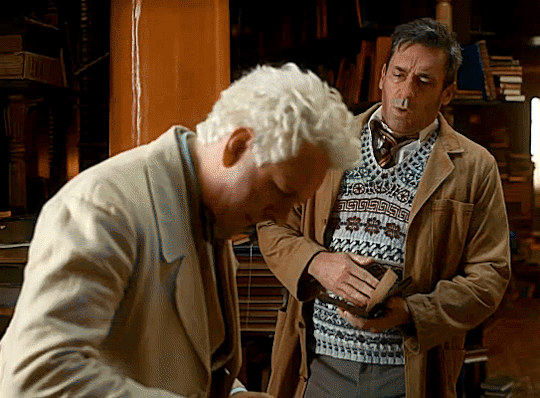
AZIRAPHALE: Ah, you startled me.
GABRIEL: Is that good?
AZIRAPHALE: I just didn't see you coming.
I actually thought I might start with this little scene, where Jim gives Aziraphale a jump-scare by creeping up next to him silently. Annoyed, Aziraphale tells him to make some noise as he moves about, and Jim trolls him with some creaking noises, before starting to sing.
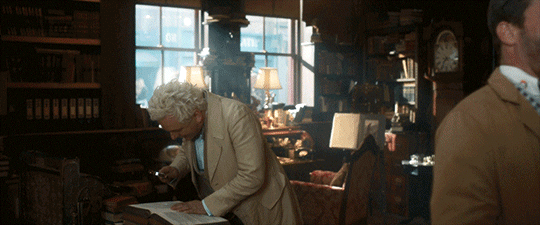
There were prophecies about the arrival of Jesus, but the ironic thing here is that Aziraphale, someone who has a vast collection of prophecies and is someone you could consider an expert, had no warning of Gabriel's arrival - he just crept up to the door as a nasty surprise!
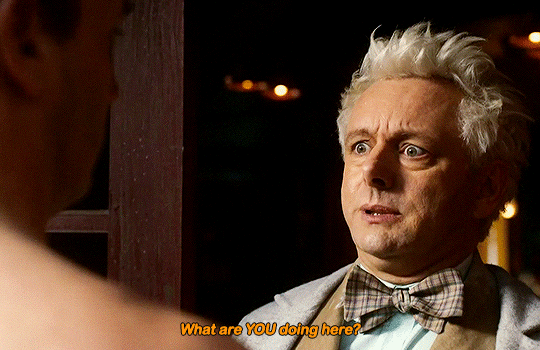
Starting proper, there were the three temptations while Jesus was fasting in the wilderness.
Making bread out of stones (I've also covered the Eccles Cakes here in the Altar of Eccles Cakes. They have multiple purposes!)
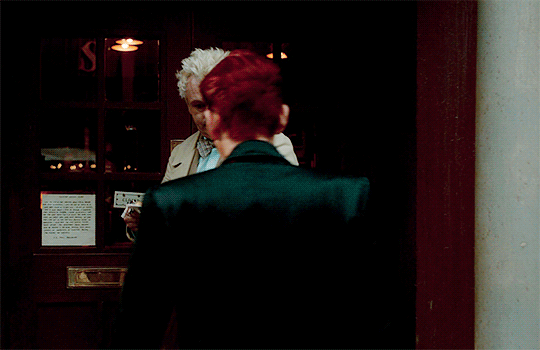
2. Being tempted to jump from a pinnacle of a temple and relying on angels to break his fall.
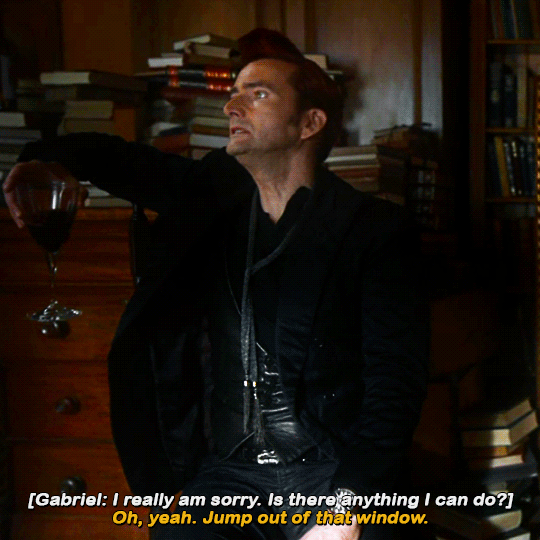
3. Being tempted to worship Satan in return for ruling all the kingdoms of the world.
This one was actually covered in S1, at Golgotha. I know Crowley mentioned to Aziraphale that he was the one who tempted Jesus, but I wrote a meta about it because I realized most people were missing the joke in the TWO demon names that Aziraphale suggested Crowley had changed his name to, and how that relates to that particular temptation.
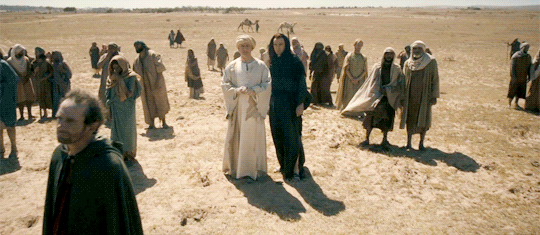
The last miracle performed before the Passion was the raising Lazarus from his tomb, four days after he had died.
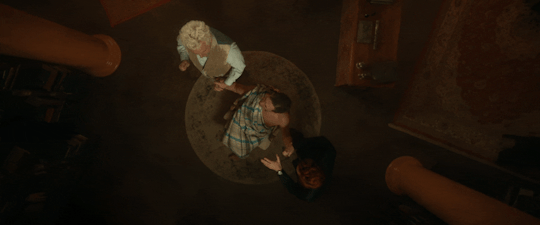
After Crowley is dragged down to Hell for an interview with Lord Beelzebub and finds out they are being threatened with the Book Of Life for being involved with Gabriel, he rushes back to Aziraphale and says they have to hide them. As they decide they will try a shared minor miracle Jimbriel descends the spiral staircase:
GABRIEL: Hello. Where did you come back from?
CROWLEY: Outside.
GABRIEL: Outside? Hmm. Is it big? Can I see the outside?
CROWLEY: No, no, no, no, no. No, no no. You need to stay here, inside the bookshop. We can look after you in here. Just stay here.
Inside? Inside the tomb? Aziraphale has even 'wrapped' him up for the occasion.
Later, we find out that:
AZIRAPHALE: Jim is in his bedroom upstairs. I told him bookshops are always closed on a Wednesday. As for Inspector Constable, at a guess, they were sent to verify the 25 Lazarii miracle you and I seem to have accidentally performed together the other night.
CROWLEY: That's how you lot measure miracles? How many times it could have brought someone back from the dead?
Uh huh. The miracle of Lazarus.
The Entry into Jerusalem
Jesus made his way into Jerusalem by donkey to show that he came in peace, not as conquering king on a horse. Gabriel does the same.
But he walked in, you say, on foot!
Yes, but he walked by the Dirty Donkey pub on his way to bookshop.
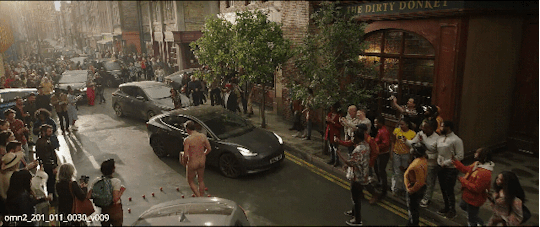
Next, was the Cleansing of the Temple.
What temple? The bookshop, of course! Is it not a temple of books?
Aziraphale sets Jim to cleaning it, with a duster.

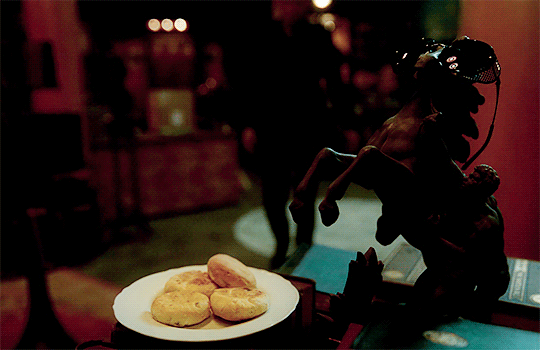
I'd say you could also call the bookshop a temple to Crowley - it is decorated in his colours, after all. The presence of Jim initially drives the merchants and money dealers demon away, snatching his sunglasses from his mini-altar as his goes.
The last step on the Passion I'll cover in this meta is the Anointing of Jesus. It tells the story of how Jesus had an expensive perfume, worth a year's wages, poured on his feet from an alabaster jar by woman who was considered sinful. The gathered Disciples were aghast at this waste - they asked why she did not sell the perfume instead and give the money to the poor. Jesus thanked her for preparing him for burial.
This one had me stumped for a while, and I had to think hard about where something had been "poured out" on feet, because I was pretty sure no one had been "anointed" on the head, which is another version of this part of the narrative. Then I remembered seeing a GIF that was Aziraphale focusing on the floor for a number of seconds after Crowley had upended the box Gabriel had carried to the bookshop with his fly in it to read the message on the bottom of the box.



My precious...! You poured them out at your feet, Crowley!
Alabaster is a soft white stone that is easy to carve. The bland cardboard box makes a good analogy for this. And in it we see Aziraphale has filled it with priceless treasures - not one but two lost Shakespeare plays!
If at this point you are going "Wait - Wot? Now you're telling me both Jim/Gabriel and Crowley are playing the part of Jesus here?" I'm saying yes. It's not the first time I've said it. I'm not the only op who has been saying it, either. And as we head into part two of this meta you'll see Crowley take on more of this role from Jim/Gabriel. The two of them have a lot in common, much more than you might have suspected or might even want to acknowledge. This is the past echoing into the present again. I think it also gives us some interesting things about the future to contemplate.
Next: Part 2 - Trials and Denials
Where we move on to the Last Supper, and the Arrest of Jesus before his before he is judged before a court of priests and then Pontius Pilate, and the gathered crowd.
This post was inspired by @mr-period 's long meta Remembering Something Forgotten-Where is Jimmy Boy?
More reading on the Dirty Donkey in my meta here.
#good omens#good omens 2#good omens meta#aziraphale#crowley#good omens analysis#good omens theory#gabriel#jimbriel#the passion of jimbriel#the passion#golgotha#the dirty donkey#i am in the fly#25 lazurii
98 notes
·
View notes
Text
This morning's rehearsal for tonight's performance. On the night of December 24th, the Sybil gives its prophecy.
El Cant de la Sibil·la (The Song of the Sibyl), in L'Alguer called Lo Senyal del Judici (The Sign of the Judgment), is a liturgical drama explained through song where a Sibyl (an Ancient oracle woman) prophetizes and describes the Apocalypse.
In the Middle Ages, this prophecy was performed in different parts of Southern Europe, but the Council of Trent (meeting of the Catholic Church in the years 1545-1563 to unify the Catholic response to Protestantism and its liturgy, bashing heresies) banned it because it considered it a pagan ritual. Somehow, in Mallorca and L'Alguer they continued to represent it, and has survived to this day, still with the original lyrics in Medieval Catalan that were translated from Latin in the 13th century. The most iconic moment comes at the end of the song, when the Sibyl raises her sword to draw a cross in the air.
Since the 19th century, other parts of the Catalan Countries (Catalonia and the Valencian Country) have revitalized the tradition and nowadays it's widely performed in many churches in towns and cities all around the Catalan Countries, like it once was.
In 2010, UNESCO declared Mallorca's El Cant de la Sibil·la Intangible Cultural Heritage of the world.
Video: Catedral de Barcelona.
#cant de la sibil·la#tradicions#nadal#mallorca#illes balears#l'alguer#traditions#cultures#culture#christmas#christmas traditions#ancient#oracle#prophetess#catalan#apocalypse#music#música#arts#gregorian chant
62 notes
·
View notes
Note
Is Latino not an ethnicity????
It isn't (and it isn't a race either). Latinidad is a political identity with some sociological, cultural and historical background. What it does not have -and I cannot stress this enough- is shared genetics/common ancestry which is how I see it most referred.
Here's the definition of ethnicity from Wikipedia:
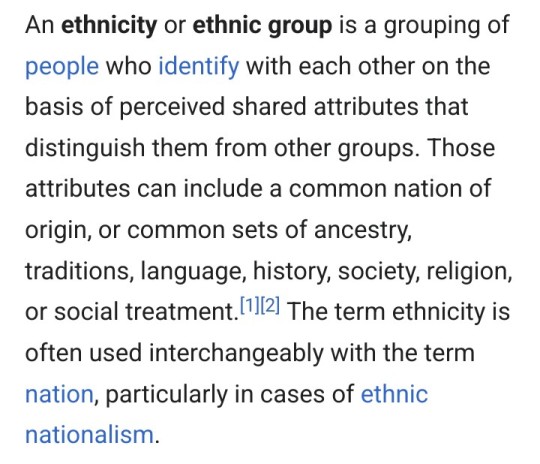
And to use roughly the same source, here's the Wikipedia disaggregation of Latin America today (which ofc I have issues with lol I'm not missing the irony of telling you "Latin America is sooo diverse" while using the "Asian" category, but I need to make do:
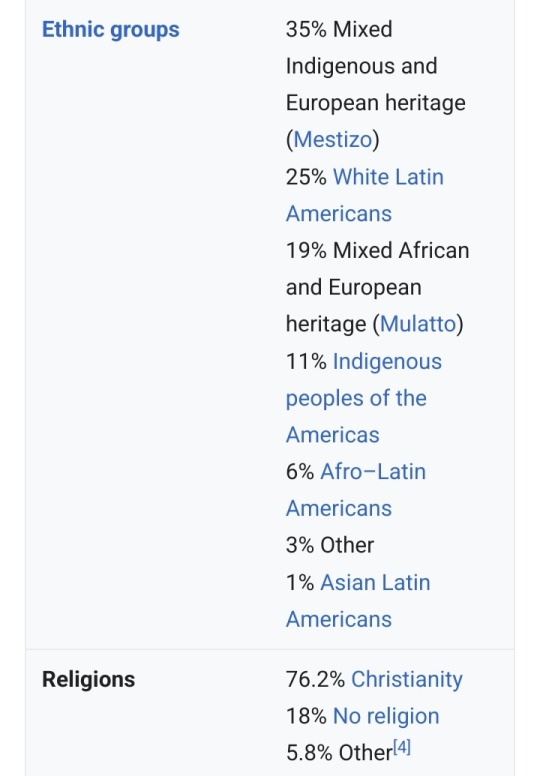
See what I'm getting at?
Let's continue, you can say "well I didn't mean genetics, I meant everything else"
Okay language:
Latin America includes hundreds of native languages like Quechua, Mayan, Guaraní (oficial language of Paraguay!), Aymará or Nahuatl, and always has! Without counting the beautifully mixed and improved Spanish, Portuguese (which I called Brasilero for years as a kid lol) and French, or even later additions like Welsh, Japanese, Chinese or Arabic from immigrant clusters that still speak it or are currently arriving into the continent.
So language isn't it either.
I don't even need to get into traditions c'mon look at Carnaval in Brasil, día de los muertos in Ecuador, an 9 de julio in Argentina and tell me those are all the same. Look at empanadas, tacos, humitas, pizza brasilera, tequeños, asado, sudados, etc
Religion? Argentina alone has the second biggest Islamic and Jewish populations in America after the US. Sure Christianity is paramount given the invasion and imposition by Catholic monarchies by the Spanish and Portuguese, but to say it's the only religion is to spit in the face of again, hundreds of native people's whose religions have been systematically erased since 1492. It is also quite reductive to only take institutionalised religions as valid forms of worship, or to ignore the fact that most Catholicism here would give European orthodox Catholics a stroke.
Now, history and social treatment, here's where the good stuff is.
Independencias:

These all look super different but these are processes and most of them took place in the first 3 decades of the 1800s so they're not that far off. These were carried out with an idea of hermandad. They used to be virreynatos under the same rule, we (patriotas) were all getting independence from the same monarch power (realistas). There was a lot of collaboration between administrations and armies. This was a decision from the leaders of the time, to seek strength in numbers.
The fact that we had to gain independence is a point of contact as well. At that time "patria" was understood as the desire to be independent, there were no neat lines to separate the territories. At this point in history you'll find lots of key people like San Martín, Juana Azurduy and Bolivar talking about "pueblos americanos" as a way to claim independence from imperialist/colonial European rule. (Brasil had a different history with the Portuguese court moving there)
The term Latin America or Latinoamérica came by a little later, the earliest it's been found used is 1856 by a politician from Chile, as you can see, the context it is used in is purely political.
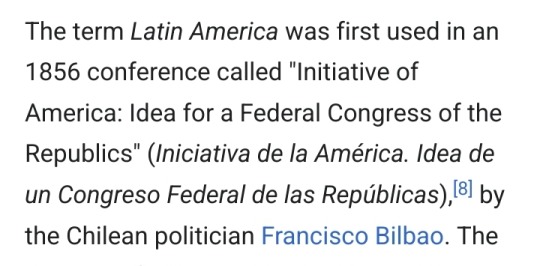
Historically, the term when used by Americans is heavily tied to a way to gather strength in solidarity for independence and rejection of foreign imperialist aspirations, from the United States, France, Spain, etc etc.
I think latinidad is in a way a self fulfilled prophecy, we were invaded and as such "unified" where before were hundreds of different peoples. We took that very same unification and made it ours, in part because the rest of the world insists on putting us all in the same bag (included with things like the School of the Americas in the 1960s-1980s where all of Latinamerica was deemed safer for the US to be ruled by genocidal military governments than democracies that smelled just a little communist. Spoiler! it wasn't safer for us who had to actually live under them)
I reject the idea of latinidad as an ethnicity because it stems from the idea of "la raza latina" which is very very racist ("latinos" were the white Europeans from Romance language countries aka Spain, Portugal, France and Italy, there was a clear hierarchy there usual to the era that still affects our social and economic framework). It's reductive and it pretends to obscure and muddle a very clear and deliberate political choice that is to identify as latinoamerican.
This also applies to the latin people who emigrate to the US and their descendants, both the ones fixing the lawns and the ones emigrating without need of a visa to work a stable 9-5. Even if it seems only the first ones get the name.
So what's latinidad? It's whatever we say it is, hope this helps ✌️
#asks#anon#i do wonder what brought the question on lol#mmine#america latina#latam#i rewrote this a million times#and it isn't even close to comprehensive but it is what it is#you'd need ten years of study to even begin to grasp latinidad if you don't have a life of it
50 notes
·
View notes
Text
One of the things that makes my brain hurt a little in fandom is this tendency to not think through the implications of a theory and instead just kind of adopt a surface change or idea without following that thought through.
This came to mind because of the whole “who is the real hawk of light’ thing. Like it does seem to largely arise from imposing Catholic or Christian ideology on Berserk along with a lot of like traditional western heroic narrative assumptions: Griffith is the antichrist (VILLAIN) so now we need a “christ-figure” (HERO/SAVIOR) to unmask him and stop his evil.
But like, if you think about the way Berserk’s world works this has a lot of issues - Berserk’s God is the Idea of Evil. Griffith himself is considered an archangel (no one ever talks about that LMFAO they just focus on the demon thing, but he’s both. Even witches call him an angel). The prophecies seem to be sent by 1. Griffith and 2. The Goddess of Flames, who is Slan.
So if you think Griffith isn’t the Hawk of Light - if you think there’s some other “real” Hawk of Light... where does that even fit in? Who sent that prophecy? Because it sure wasn’t the one who controls destiny in Berserk’s world.
This happens with relationships a lot, too but I’m not trying to start a character interpretation war so I’m just going to leave it there. In closing, I am begging people to test their theories against the reality of what that theory would mean in context.
#ariel talks about berserk#fandom bullshit#honestly though#context seems to be a huge problem for people#in fandom and otherwise#and it drives me crazy every single time.
54 notes
·
View notes
Text
Brigid Deity Guide

Who is Brigid?
Translated as “The Exalted One” in Old Irish, Brigid is a Gaelic-Celtic Goddess of many things including fire, poetry, fertility, spring, and craftsmanship. Other spellings of her name are Brig, Brighid, or Brigit.
Not unlike many of the Tuatha Dé Danan, Brigid is thought to be a Triple Goddess, similar to The Morrigan. Some believe this means she is three sister goddesses or that she is one goddess made of three different aspects. These sisters, or aspects depending on your belief, would be Brigid the Healer, Brigid the Smith, and Brigid the Poet.
By far Brigid was one of the most popular goddesses of the Celts, as she had variations across the Celtic world where her name was Brigantes or Briganti.
The Welsh know her as Ffraid, in Scotland her name is Brìghde/Brìde.
Parents and Siblings
Dagda (Father)
Aengus (Brother)
Midir (Brother)
Aed (Brother)
Cermait (Brother)
Bodb Derg (Brother)
Lovers or Partners
Bres
Children
Ruadán
Epithets
The Exalted One
The High One
Brigid of the Hearth
Notes
Though the Dagda has been established as Brigid’s father, it’s not certain who her mother is. Some say Danu, others say The Morrigan, though this is less likely. I personally have yet to find anywhere that names a mother with any evidence.
Brigid is considered a Mother Goddess.
Brigid has been conflated with the Catholic St. Brigid, who was the daughter of a converted Druid. It is believed by some that St. Brigid of the Catholic church was inspired by the Goddess. The two share many features and even a holiday.
St. Brigid’s day is February 1st and lands on the same day as the Irish-Pagan holiday Imbolc, leading some folks to believe that the saint is a Christianized version of the ancient goddess. However, no study has found there to be any historical link between them.
Brigid was likened to the Roman Minerva, the Greek Athena, as well as the Proto-Indo-European goddess of the dawn.
Brigid has also been known to go by Dana or Danu, though they are also separate deities.
In mythology, Brigid invented Keening, which is a mix of weeping and singing while mourning the death of her son.
Brigid is heavily linked to Irish Holy wells.
Brigid is also known for prophecy as she was worshipped by seers.
She is associated with fire due to her associations with the hearth and smiths
Ultimately there is very little historical information about Brigit, surprising considering she is so popular now and was popular even in the past.
Modern Deity Work
Disclaimer - Not all of these are traditional or historic correspondences nor do they need to be. However, any correspondence that can be considered traditional will be marked with a (T).
Correspondences
Rocks/Stone/Crystals
Gold
Brass
Iron
Fire Agate
Warm colored stones
Herbs/Plants
Oak (T)
Rowan
Clovers
Heather
Chamomile
Early spring flowers
Blackberries
Animals
Boar (T)
Oxen (T)
Serpents
Offerings
Milk (T)
Honey
Alcohol
Candles
Coins (T)
Acts of Devotion
Light a candle
Hold a bonfire for her (or use your fireplace)
Create or recite a poem for her (T)
Hone your craft, whatever it may be!
References and Further Reading
Brigid, Bright Goddess of the Gael - Mythicalireland
Brigid - Mythopedia
Brigit - Britannica
Brigit - Mythus Wiki
Brigid - Druidry.org
Myth and Legends of the Celtic Race by Thomas Rolleston via Sacred Texts
Song of Brigit - Celtic Wonder Tales by Ella Young via Sacred Texts
The Spirit of the Celtic Gods and Goddesses by Carl McColman and Kathryn Hinds
Devotees and Followers to check out:
@mrs-k-cottage-witchch
@polyteleology
@the-purvashadha
as recommended by the community.
Edited for accuracy.
262 notes
·
View notes
Text

This quote is from a book titled “Something That May Shock and Discredit You”. It’s a trans catholic memoir. So, as a Christian transfem, I’d like to share some of my trans positive Bible verses, because contrary to popular belief, it’s in there
Genesis 1:27
This one is often used for transphobic rhetoric; but let’s flip it on its head: the Bible states that “male and female He created them”. Many use this to support the idea that being trans is wrong or use it as intersex erasure. However, when we zoom out into a wider context, the scripture just talked about Him making land and sea, light and dark, land creatures and water creatures. These are all polar opposites; but the Bible doesn’t say the in between aren’t still beautifully made. Estuaries, dusk, and platypi are not any more abhorrent to God’s creation than being trans is!
For the next few selections, I’d like to start by defining what a Eunuch was. A eunuch, in biblical times, was a person (often born male due to the first definition) who had either been castrated or born what we now know as intersex. Eunuchs would often serve roles outside of the gender binary, or serve both male and female roles.
Acts 8:26-40
This passage tells the story of a eunuch from Ethiopia who was able to be baptized. What I found so profound about this selection is that the early church was not discriminatory- Phillip, the one who baptized the eunuch, could’ve easily said “well we’ve never baptized a eunuch before, so I don’t have to accept you.” But Phillip loved them and showed them compassion anyway.
Matthew 19:12
This passage describes marriage, and how a traditional marriage isn’t necessarily for everyone. Jesus says that there are eunuchs who were born that way (intersex), eunuchs who were made that way by others (castrated), and eunuchs who had become eunuchs for the kingdom of heaven. Some interpret that last part as those who choose not to marry to devote themselves more to God, however there is a WIDE range of interpretations, including some that believe that this is Jesus praising trans and non binary individuals. God even says that he will provide a monument to eunuchs in his house in Isaiah 56:1-8, and while this prophecy has not yet been fulfilled to our knowledge, it could relate to Jesus saying that there are those who become eunuchs for the kingdom of heaven, as it is easy to interpret God’s house as heaven.
Psalm 139:13-14
This one describes us as being wonderfully made by God. Some argue that trans folks go against God’s will by changing their gender, but I would argue the opposite. God has made each and every one of us special, and he knows all of our most inner workings. You’re really telling me the God of all creation didn’t plan for us to be expressive in our identities? I believe that God loves us all, and it is a blessing from Him that we get to be unique.
Galatians 3:28
I believe this one to be the nail in the coffin for Christian transphobes. It states that “There is no longer Jew or Greek, there is no longer slave or free, there is no longer male or female; for all of you are one in Christ Jesus”. That’s it. Doesn’t matter who you are, we are all equal in the eyes of God.
And what if my interpretations are wrong?
Matthew 22:37-40: “Jesus replied: ‘Love the Lord your God with all your heart and with all your soul and with all your mind.’ This is the first and greatest commandment. And the second is like it: ‘Love your neighbor as yourself’. All the Law and the Prophets hang on these two commandments.”
You have no excuse to use Christianity for hate. And with that, I’d like to close off with a saying from everyone’s favorite talking vegetable show: “God made you special, and He loves you very much.” That’s right. No “if”s. No “but”s. God made you special. He loves you- all of you- very much.
21 notes
·
View notes
Note
Thinking abt the Miraak x Mara priest TLD where Mara priest is very devoted (catholic undertones) and is sworn to the purest form of love (catholic undertones) and is completely celibate as to appease their lady (catholic undertones) idk how aedra worship works much, but I’m assuming since Erandur gives off heavy priest vibes it works.
They spare Miraak, and are determined redeem him, however uh oh looks like the chosen one is touch starved and uh oh! Looks like Miraak is a very handsome nord under that mask and…uh oh! Looks like they have to share a tent with him! And uh oh! Looks like somebody is well read and charming………….
heya this is the first thing i’ve written in so, so long. sorry it’s a little rough lol.
minors dni, it isn’t explicit but like. it’s almost there. it’s nsfwish. they/them used for the dragonborn because that’s what anon used
Their muscles screamed but they forced one foot in front of the other. The Dragonborn gritted their teeth together and took another tortuous step through the gathering snow. Miraak’s dead weight threatened to drag them down, tempting them to give in to the urge to simply lie down and wait for the elements to finish the job. His arms were locked around their neck and the points of that damned mask were doing a number on their armor.
“Lady Mara, protect me.” The Dragonborn found comfort in the weight of an amulet resting heavily in their pocket. The implications of wearing it were enough to make their cheeks flush - they could not wear it as worshippers of the other Divines were permitted to without drawing unwanted attention. The traditional robes worn by those who cared for her shrines and temple weren’t suited for the Dragonborn’s adventurous lifestyle.
Miraak’s fingers brushed over their solution - the worn thread of Mara’s symbol long ago embroidered onto their cloak by an old friend. The Dragonborn wasn’t sure where his mind was but his body was becoming more restless with each moment. Their trek was almost complete.
It was by pure chance they’d stumbled across the shallow cave. Miraak’s palace was intimidating and they’d made countless circles around it, surveilling it, searching for its weakest point. The former inhabitants of the cave were a small band of werewolves that had unfortunately fallen to the Dragonborn’s blade. Their guilt lingered but some small part of their brain recognized that it had to be a small miracle, somewhere safe to place Miraak while they attempted to heal him. Perhaps Mara had been keeping a close eye on them.
It was unbearable, hauling him across Solstheim’s tundra. His boots dragged and his mask stabbed them with every step. It was the only touch the Dragonborn recalled receiving in years - they shook hands and often placed their hand on a shoulder or forehead during blessings but it had been far longer since they felt the touch of another person. Their love was reserved entirely for Lady Mara, finding her instructions to live soberly and respectfully fit into all aspects of their life. It was easy to keep distance from others when you became the embodiment of an ancient prophecy.
He was warm. The Dragonborn could feel each breath he took, his large chest pressed to their back and somehow it felt like breaking their chastity being so close to him. With his arm around their shoulders and hand bumping against the front of their armor was far too intimate.
That dark, oily power granted by Hermaeus Mora radiated from him. The Dragonborn knew they should’ve left him to Mora. Miraak had been nothing short of an antagonist in their life for months - stealing Dragon Souls they desperately needed to help those still struggling in the wake of the Civil War, enslaving the people of the island for his own selfish purposes, and taking every opportunity to insult them.
But they couldn’t shake the feeling there was something in him worth saving.
Perhaps it was Lady Mara’s light shining through the Dragonborn, she saw something that was far deeper than mortal eyes could see. There was something within Miraak, some scrap of the First Dragonborn that could bring light to Nirn after all of the damage he’d inflicted upon its people. If Lady Mara felt strongly enough about Miraak to guide the Dragonborn they would not refuse.
It was either luck or Mara’s grace that Miraak remained unconscious as long as he did. The Dragonborn dumped his body onto the hard ground once they were safely hidden within Frostmoon Crag, walls of chilly stone serving as their shelter. He grunted once before lapsing back into silence. The Dragonborn kept a careful gaze on him while they set up the tent that had housed them countless times. It was only intended for one person and they still hadn’t decided if letting Miraak out of their sight was a good idea. He could wake at any point of the night and disappear - or do far worse to them.
Once the meager fire was built, they heard him stirring. Miraak’s deep groan rumbled through his chest and the Dragonborn felt something akin to excitement shoot up their spine. A gloved hand rose to his face, easily knocking the mask out of its way before rubbing at his forehead. The Dragonborn watched in silent awe through the shivering flames as Miraak propped his arms up, eyes closed and sucking in a deep breath. Was he unaware of their presence? It felt odd watching him, the vulnerability of seeing his face.
“You’re staring.”
His voice shocked them. The Dragonborn felt a terrible fluttering in their chest when his eyes cracked open, sliding over the little campsite before glowering at them. His lower lip was cut and bloodied but still he smirked at them, his eyes a dark green they’d never seen before. They felt their cheeks heat up and realized what they were doing - who they were looking at and reigned themself in. Clutching at the amulet in their pocket the Dragonborn stared into the fire and forced their thoughts to return to the mental recitation of a familiar prayer.
“Sorry to disappoint.” His voice was just quiet enough to make the Dragonborn wish they could move closer. It was enticing to hear him speak so softly after hearing his booming Shouts for so long.
“Disappoint?” They cleared their throat and shoved away thoughts that threatened to turn indecent when he tossed his cloak aside.
“I’ve been told that people expect some horrid mass of tentacles behind the mask.” Was he joking? “My face has been known to cause disappointment.”
The Dragonborn didn’t have a response that didn’t directly contradict their wholehearted dedication to Lady Mara. They chose to instead gather their knees close to their chest and center themself, remembering the purpose in saving him. They knew some of Mora’s filthy power remained within him and could only pray that Mara’s loving embrace would be enough to save him.
“You are not what I expected.” The Dragonborn finally stated. It was rare for Miraak to be so quiet, so docile. They feared the only chance at a calm conversation was slipping away.
They could feel his gaze. His eyes were on them, sharper than last time. The Dragonborn reminded themself that they were more powerful than him. They had defeated him multiple times. They were going to salvage the part of his soul that remained intact. They could hold a simple conversation with him.
“What did you expect?”
“I expected you to start another fight as soon as you awoke.”
“Is that what you want, Little Dragon?”
His voice was directly in their ear. When had he moved closer? They’d been so focused on staring into the fire and avoiding the impure thoughts about him tickling at the back of their mind, they’d allowed Miraak to get within striking range. They would not tolerate any more distractions. Lady Mara had blessed them with the power to heal and they refused to let it go to waste.
“I do not want to fight you.” Turning their stare on him, the Dragonborn found Miraak’s face within inches of theirs. Heat flashed across their face when they remembered the warmth of his body pressed to theirs, the calming rhythm of his breathing against their back.
“We are good at fighting each other.” Miraak’s sinful lips broke out in a smile, teeth that looked just a bit too sharp reminding the Dragonborn of how dangerous he was. “It was the only contact I got over these past few eons.”
“I do not wish to fight you anymore.” The Dragonborn insisted, the amulet clutched in their clammy hand. Why were they so nervous? They’d done this countless times before. Citizens all over Skyrim had been healed or blessed by their scarred hands. Miraak should be no different. “I am a disciple of Lady Mara. I received her blessings and accepted her into my heart.”
“And you wish for me to do the same?” He leaned closer, that devious smirk still on his face. He knew he was getting under their skin and enjoyed it. A light danced in the depths of his eyes when they refused to back down. “How is it that you perform these blessings, Dovahkiin? Last I heard, Mara’s only purpose these days is when some farmers decide to marry.”
“Lady Mara is the Divine of love. She is not some simple signature on a license of marriage.” Rage burned away any of their nervousness and the Dragonborn found one of their fingers stabbing into Miraak’s unarmored chest. The tunic he wore was torn and stained, though they couldn’t be sure if the blood was his own or from one of his many victims. “How long have you lived without love in your heart? Without being comforted or healed?”
“Will you bless me, then?” Miraak’s voice deepened, a strand of his hair falling into his face. The Dragonborn took a calming breath, reminding themself that Lady Mara had led them to Miraak’s palace and must have a reason for doing so. She must know that his soul was worth saving and their connection was important to his redemption.
“I will.”
Miraak remained quiet while the Dragonborn worked. They spread wrinkled blankets over the floor of the tent, the one pillow squashed from its life at the bottom of their pack would have to work. Ceremonies honoring Mara were usually held within her temple with plenty of pews or near one of her shrines, cushions provided for those performing prayers in her name. The Dragonborn maneuvered Miraak until he sat squarely in the center of their tent, eyes closed and hands resting in his lap. That damned smirk was still on his face as if he doubted they would be able to cleanse him of Mora’s influence.
A couple busted sticks of incense smoldered near the entrance of the tent and their amulet of Mara sat nearby. It was a comforting sight, something to ground them in Miraak’s distracting presence.
“We pray to you, Mara, Mother of Love.” The Dragonborn recited the words Maramal had long ago drilled into their brain. He remained earnest in his belief even after so many years while the Dragonborn had become used to their faith, a quiet companion. “Mother Mara, turn your gaze upon this pure soul. Bless us with your gaze.”
Surprisingly, his only response was a short bark of laughter. No condescending commentary on their faith. The Dragonborn repeated their appeal for Mara’s attention and love while they kneeled before Miraak. Placing the amulet of Mara on him felt strange but he didn’t fight it. His eyes remained shut as if truly absorbing the words the Dragonborn recited over him.
Clasping hands with Miraak, the Dragonborn channeled their faith and love of Mother Mara into the touch as they had so many times before. The soft golden glow of Mara’s restorative magic lit the small tent, unfortunately highlighting his handsome features. His touch was warmer than expected despite the nervous chilliness of the Dragonborn. His thumb ran over the back of their hand, a gesture far too intimate for people who had fought to the death. He must be trying to unnerve them.
“How has Mara blessed you, Little Dragon?” He murmured, not bothering to open his eyes. He somehow knew just how to fluster them. His hands left their grasp, skimming up their shoulders to play with the clasp of their cloak. They had to blame the shivers and goosebumps on the sheer length of time since they’d last felt someone’s touch. Miraak simply could not be affecting them in such a way.
“The Lady has brought light and purpose into my life.” The Dragonborn gulped, ignoring the need pulsing through their body.
“Has she brought you love?”
“I hold love for all children of the Divines.” The answer was automatic, something they’d stated many times before.
“She is the Goddess of Love though, correct? Has she not brought love to a devout follower like you?” His fingers were wandering freely over their armor and the Dragonborn tried to summon the will to tell him to stop. It felt like he left a trail of fire in his wake, leaving their body alight.
“My lifestyle is not compatible with a spouse.”
“I don’t recall mentioning a spouse.” Miraak’s tone was teasing. He knew exactly what he was doing. The Dragonborn cleared their throat and continued with their prayer, hoping that Miraak would fall back into his silence.
“By your grace Mother Mara, allow us to live peaceful and sober lives. To honor our families and homes in your stead.”
“You should’ve been a follower of Dibella instead of Mara.” Miraak’s hands wandered over the Dragonborn’s waist and settled on their hips, drawing them in closer. The stumbled over their words, intending to reprimand him but he felt so fucking good. “This would be much more fun.”
“I honor a pure love in Mother Mara’s honor.”
“And you deny yourself pleasure in her name, too?” Miraak murmured, a thumb tracing their lower lip. The Dragonborn heard themself moaning and was startled that such a wanton sound could come from them. “Surely she wouldn’t want such a pious follower to miss out on pleasure simply because it is impure.”
“I worship Mara because she saved me when I was nothing, she gave my life purpose.”
“I wish you would worship me, Little Dragon.” Miraak’s lips brushed over theirs for a fleeting moment and the Dragonborn felt their control falter. The years spent honoring Mara in all of their actions, shoving down their wants and needs in the name of honor disappeared the moment Miraak’s warm breath tickled the overheated skin of their throat.
It was so wrong to be vulnerable with him like this. It was dangerous and against everything Maramal and Dinya had preached for so many years but it felt right. Miraak’s strong grasp on their waist when they twisted fingers into his unruly hair, his teeth scraping skin sensitive from being untouched for too long.
“I would give you pleasure you can’t even imagine.” He mumbled against their skin and the Dragonborn forgot about the vows they’d made so long ago. His touch was everywhere, mouth leaving kisses in its wake until the Dragonborn couldn’t think about anything other than him. “Or perhaps it is your turn to be worshiped.”
127 notes
·
View notes
Text
The Planets as Angels and Demons
In my tradition I work with planetary virtues by assigning them to days and hours in which certain works must be performed. As someone who also works in a Catholic context, I've assigned Angels and demons to embody the benefic and malefic aspects of these Planets. To me, an angel is not ruled by a planet, but is the planet itself. This is where anism comes into my practice. I acknowledge western occult classifications of angels and their planets, but I rework them to fit my own revelations instead of that according to old irrelevant wiccan men. That said, the 7 angels vs 7 demons lists across the world are heavily influenced by kabbalah. However my own list pulls from Greek Orthodox traditions and Philippino Catholic traditions based in Manila. I also allow the 3 books of occult philosophy to influence my worldview of these spirits and purposes. The 3 books of occult philosophy state that there is a benefic and malefic side to each planet. To copy this within my practice I assign one angel and one demon to a planet. I come to them not in ceremonial methods, but as folk saints.
The angels and their remedies are as followed:
Uriel- (sun/sunday) "regent of the sun" in folklore. He is known for being renowned, amiable, and acceptable; he adds potency in all good works, equaling a man to kings and princes, elevation to high fortunes, and success in all endeavors- I understand Michael as being the Sun in most traditions but I view micahel as being more war-minded and aligned with Mars. Uriel is historically referred to as regent of the sun and that should not be ignored.
Gabriel- (moon/monday) rendering the bearer grateful, amiable, pleasant, cheerful, and honored; removing malice and ill will, security during travel, increase of riches, bodily health, and the driving away of enemies and other evil things. - dreams, blessed pregnancy, prophecy of futures pertaining to spiritual paths and one's fate. Protector of families.
Michael-(mars/tuesday) potency in war, judgments, and petitions; victory against enemies, justice toward enemies for the sake of justice, not revenge. , and stopping of blood. Michael isncommonlynassociated with the color red and as mars is the" red planet" I saw it as fitting. Mars is described as our "sister planet" due to its similarities with earth. Given michael being so close and dear to humanity I saw this closeness and resemblance as representative of his love for us.
Raphael- (mercury/wednesday) rendering the bearer grateful and fortunate to do what they please, bringing gain, preventing poverty, and helping memory, understanding, and divination. He also encourages occult understanding through travel and reading signs given in nature. The protector of travelers and claims vengeance towards thieves.
Sealtiel- (jupiter/thursday) is often seen as the Patron Saint of prayer and worship for members of the Eastern Orthodox Church and some Catholic traditions. In some Orthodox traditions, he is said to help people interpret dreams, break addictions, protect children, preside over exorcisms, and rule over music in heaven. Orthodox Christians will seek his help if their prayer is suffering from distractions, inattentiveness, or coldness. In Catholic tradition, he is depicted with a thurible. He helps fight addiction, helps one seeking gains and riches, favor and love, peace, concord, appeasement of enemies, confirmation of honors, dignities, and counsels, and dissolving of enchantments. "The undoer of witchcraft" which is a title given to St Michael Archangel in traditions that don't recognize this angel.
Jehudiel- (venus/friday) ending concord, ending strife, procuring a woman's love traditionally but all genders apply. aiding in conception, working against barrenness, and causing spiritual abilities in a generation (or gifting a child with the power of prayer). also known for the dissolving of enchantments or lustful charms of a woman causing peace between men and women, making all kind of animals fruitful, protecting pets, curing melancholy, causing joyfulness, and bringing good fortune.
Barachiel-(saturn/saturday) the ability to bring forth, to make one safe, to make one's prayer powerful, and to cause a success of petitions with princes and powers. Marsilio Ficino and others also associated Saturn with intellectuals, whose minds are more lofty and divine than those of common folk. This is because Saturn is the highest planet in occult cosmology and therefore closest to God. this angel brings creativity, good study habits, focus, peace of mind and strengthens decision making skills to ensure good choices are made. -------
The Demons to be shared below are the traditional names of demons taken from Agrippa's 3 books of occult philosophy. It was common in older orthodox beliefs to associate the demons of the 7 deadly sins with the Planets, but I find the demons of the 7 deadly sins to be less influential and deadly than planetary powers would rival. Sin is on earth and changes as nature does. It's not written in the stars and predestined. Therefore, the 7 most well-known known demons on earth would not be fit to personify a planet. Expect a post on the 7 shortly.
After requesting the aide of these planetary demons, always cleanse the soul by prayer to the corresponding angel. Cursing another is similar to rolling in the mud yourself. Wash your hands as Caesar did. Without furthermore, here are the planetary demons that oppose these angels for matters of harming others:
Sorath(sun/sunday)- causing a man to be a tyrant, proud, ambitious, unsatisfiable, and to have an ill ending. Causes requested illness and can only be remedied by the corresponding angel.
Hasmodai- (moon/monday) rendering a location unfortunate and causing people to flee from it, hindering physicians, orators and all men whatsoever in their office. Blurs the psychic senses, hides works, ruins divination, curses divination tools to never work again.
Barzabel- (mars/Tuesday) hindering of buildings/homes, casting down the powerful from dignitaries, honors, and riches; causing discord, strife and hatred among men and beasts, chasing away bees, pigeons. and fish; hindering mills, rendering misfortune toward hunters and fighters, causing barrenness in men, women, and animals; striking terror into enemies, and compelling enemies to submit. Blighting of crops and all works money flows from.
Taphthartharath - (mercury/wednesday) rendering the bearer ungrateful and unfortunate in activities, encouraging poverty, driving away gains, and inhibiting memory, understanding, and divination. Steals spiritual gifts from others and gives them to the witch, can steal luck and good fortune of others. Hides the works of thieves, and protects stolen property from recovery.
Hismael- (jupiter/thursday) attract the baleful influences of Jupiter, of which Agrippa is curiously silent. However I am here with my own thoughts and experiences. This demon quite literally brings an end to the mind. It decays one's thoughts and happiness. It causes lunacy and mania. The hottest of the demons here.
Kedemel- (venus/friday) encouraging strife, driving away a woman's love, blocking conception, encouraging barrenness, blocking generational gifts and the blessing of ancestors, bringing bad luck, destroying joy, and encouraging melancholy. Ruins families, causes miscarriage, and attracts another's lover to you.
Zazel- (saturn/saturday) according to Agrippa includes the hindering of buildings and plantings i.e. growth, casting a man from honors and dignities, causing discord and quarrels, and dispersing armies. Turns one's men against him and creates jealousy. Ends the life of men.
Call on these spirits at your own risk. Always follow it with proper spiritual hygiene.
#folk witchcraft#traditional witchcraft#transgender witches#beginner witch#folk catholicism#animism#santa muerte#folkloric witchcraft#witchcraft#demons#demonology#angelology#grimoire
14 notes
·
View notes
Text
SAINT OF THE DAY (April 5)
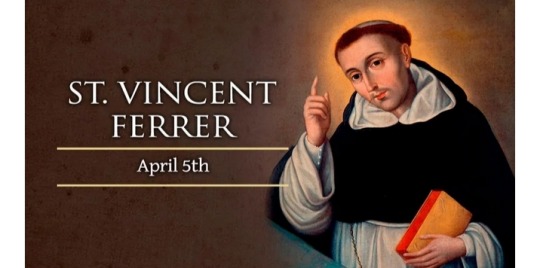
Roman Catholics celebrate the missionary efforts of St. Vincent Ferrer on April 5.
The Dominican preacher brought thousands of Europeans into the Catholic Church during a period of political and spiritual crisis in Western Europe.
Vincent Ferrer was born on 23 January 1350 in Valencia, Spain. His parents raised him to care deeply about his religious duties, without neglecting his education or concern for the poor.
One of his siblings, Boniface, later joined the Carthusian order and became its superior general.
Vincent, however, would become a Dominican and preach the Gospel throughout Europe. He joined at the age of 18 in 1374.
As a member of the Dominican Order of Preachers, Vincent committed much of the Bible to memory while also studying the Church Fathers and philosophy.
By age 28, he was renowned for his preaching and also known to have a gift of prophecy.
Five years later, a representative of Pope Clement VII chose Vincent to accompany him to France, where he preached extensively.
While Vincent sought to live out his order's commitment to the preaching of the Gospel, he could not escape becoming involved in the political intrigues of the day.
Two rival claimants to the papacy emerged during the late 1300s, one in Rome and another in the French city of Avignon.
Each claimed the allegiance of roughly half of Western Europe.
Caught between the rival claimants, Vincent attempted to persuade the Avignon Pope Benedict XIII to negotiate an end to the schism.
Benedict, who was regarded as Pope in both Spain and France, sought to honor Vincent by consecrating him as a bishop.
But the Dominican friar had no interest in advancing within the Church. He regarded many bishops of his time as negligent leaders distracted by luxury.
“I blush and tremble,” he wrote in a letter, “when I consider the terrible judgment impending on ecclesiastical superiors who live at their ease in rich palaces, while so many souls redeemed by the blood of Christ are perishing.
I pray without ceasing, to the Lord of the harvest, that he send good workmen into his harvest.”
Vincent not only prayed but acted, committing himself to missionary work and resolving to preach in every town between Avignon and his hometown in Spain.
In a commanding style, he denounced greed, blasphemy, sexual immorality, and popular disregard for the truths of faith.
His sermons often drew crowds of thousands and prompted dramatic conversions.
Popular acclaim, however, did not distract him from a life of asceticism and poverty.
He abstained completely from meat, slept on a straw mat, consumed only bread and water on Wednesdays and Fridays, and accepted no donations for himself beyond what he needed to survive.
He traveled with five other Dominican friars at all times, and the men would spend hours hearing confessions.
For two decades, Vincent and his group of friars undertook preaching missions in Spain, Italy, and France.
When he traveled outside these regions, into Germany and other parts of the Mediterranean, those who did not know the languages in which he preached would testify that they had understood every word he said, in the same manner as the apostles experienced at Pentecost.
Although he did not heal the temporary divisions within the Church, Vincent succeeded in strengthening large numbers of Europeans in their Catholic faith.
He wrote little, although some of his works have survived, and exist in modern English translations.
Vincent Ferrer died on 5 April 1419 at the age of 62 in Vannes, Brittany.
He was canonized by Pope Callixtus III on 3 June 1455.
He has recently become the namesake of a traditional Catholic community approved by the Holy See, the Fraternity of Saint Vincent Ferrer.
He is considered the patron saint of builders due to his effectiveness in building up the Church.
3 notes
·
View notes
Text

A medieval Catholic religious art image of St. John the Evangelist writing the book of Apocalypse on the island of Patmos. Artist unknown.
#traditional catholicism#traditional catholic images#middle ages catholism#middle ages catholic religious art#traditional catholic bible#the new testament#the book of apocalypse#traditional catholic bible images#traditional catholic prophecies#traditional catholic history#the island of patmos#traditional catholic saints#st. john the evangelist
25 notes
·
View notes
Text
sorry to everyone who voted asgardians as catholic in that poll i did ages ago but hela's vibes* are actually incredibly protestant. if asgard has scriptures she is obsessing over them and if asgard has icons she is smashing them. her piety is raw and fiery and unconventional, even scandalous, and yet she would claim it's the truest most distilled version when everything else has been stripped back. she wants to touch the divine directly and she wants a perfectly, unforgivingly rigid system of belief and virtue.
but i do think thor's vibes are still catholic - the timeline is reversed in this story, so hela builds the "new world" in which radical protestanism thrived and by the time thor gets there it has become the "old world". everything has been worn down and gilded over and is now a venerable, untouchable tradition to which thor is the heir. prophecies have become doctrine and holy warriors have become martyrs.
and loki... you could argue loki has tendencies in either direction, but i think, under "normal" circumstances (whatever those may be) he's actually somewhat less extreme than either of his siblings, because he also has far more doubt that either of them. i think, at his core, loki is a tortured agnostic: terrified that it's not true. terrified that it is.
*the hela i am literally making up as we speak sorry
#space viking tag#meta#not quite meta bc i'm making things up and not showing my work. but it's truuue#ch: hela#ch: thor#ch: loki
3 notes
·
View notes
Text
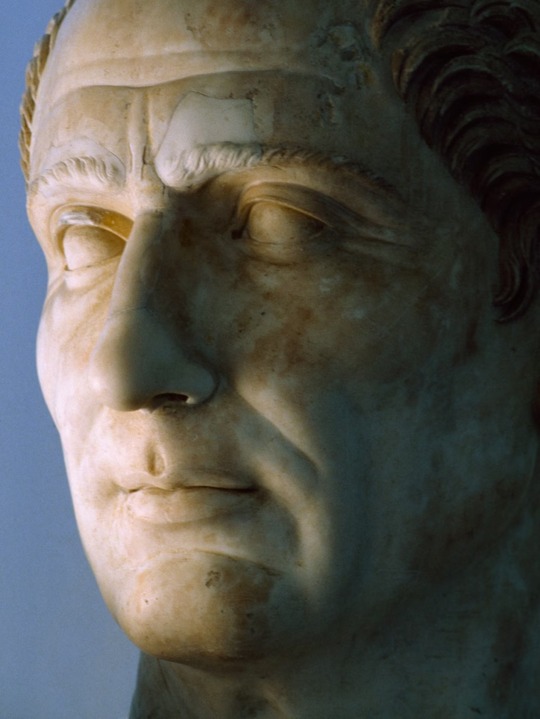
The Bloody End of Julius Caesar Forever Darkened the Ides of March. Photograph By James L. Stanfield, National Geographic
Ides of March: What Is It? Why Do We Still Observe It?
Once Simply a Time to Settle Accounts, March 15—the Ides of March—is Linked to Prophecies of Misfortune, Thanks to Caesar and Shakespeare.
— By Brian Handwerk | Published: March 15, 2011 | Thursday March 14, 2024
Caesar: The Ides of March Are Come.
Soothsayer: Aye, Caesar, But Not Gone.
—Julius Caesar, Act III, Scene 1
Thanks to Shakespeare's indelible dramatization, March 15—also called the Ides of March—is forever linked with the 44 B.C. assassination of Julius Caesar, and with prophecies of doom.
"That line of the soothsayer, 'Beware the ides of March,' is a pithy line, and people remember it, even if they don't know why," said Georgianna Ziegler, head of reference at Washington, D.C.'s Folger Shakespeare Library.
Until that day Julius Caesar ruled Rome. The traditional Republican government had been supplanted by a temporary dictatorship, one that Caesar very much wished to make permanent.
But Caesar's quest for power spawned a conspiracy to have him killed, and on the Ides of March, a group of prominent Romans brought him to an untimely end in the Senate House.
It Wasn't Just Caesar Who Paid the Price on Ides of March
Aside from its historical connection, the concept of the Ides of March would have resonated with English citizens in 1599, the year Shakespeare's play Julius Caesar was probably performed, Ziegler said.
"This whole business of the Ides of March and timekeeping in the play would have had a strong impact on audiences," she said.
"They were really struck by the differences between their Julian calendar [a revision of the Roman calendar created by Caesar] and the Gregorian calendar kept in Catholic countries on the continent."
Because the two calendars featured years of slightly different lengths, they had diverged significantly by the late 16th century and were several days apart.
In Roman times the Ides of March was mostly notable as a deadline for settling debts.
That calendar featured ides on the 15th in March, May, July, and October or on the 13th in the other months. The word's Latin roots mean "divide," and the date sought to split the month, originally at the rise of the full moon.
But because calendar months and the lunar cycle are slightly out of sync, this connection was soon lost.

A later artist's conception of the funeral of Julius Caesar, who was killed on the Ides of March in 44 B.C. Illustration By C. Vottrier, Mary EvansPicture Library/Alamy
Ides of March Assassins: Heroes or Murderers?
The Ides of March took on special significance after Caesar's assassination—but observance of the anniversary at the time varied among Roman citizens.
"How they felt depended on their political position," said Philip Freeman, a classicist at Luther College in Decorah, Iowa, and the author of Julius Caesar.
"Some were thrilled that Caesar had died, and some were horrified," he said.
The debate about Caesar's fate has extended through the ages and was taken up by some major literary figures. In Dante's Inferno, for example, Caesar is in Limbo, a relatively pleasant place in hell reserved for virtuous non-Christians.
"But Brutus [one of the leaders of the assassination] is down in the very center of hell with Judas, being munched on by Satan—it's about as bad as you can get," Freeman said.
The Folger library's Ziegler thinks the Bard had a more balanced view.
"I think Shakespeare shows both of them as being humans with their own weaknesses and strong points," she said.
Whether they were heroes or murderers, the real-life Ides of March assassins were subjected to less than pleasant outcomes.
"Within a couple of years Brutus and [fellow assassin] Cassius were dead," Freeman noted.
"They were not able to bring back the Republic, and really what they did was usher in more of a permanent dictatorship under the future Roman emperors—the opposite of what they intended."
2 notes
·
View notes
Text

“If we are intended for great ends, we are called to great hazards.” –His Eminence, St. John Henry Cardinal Newman
Laudetur Jesus Christus! On this day in 1971, His Eminence, Venerable József Cardinal Mindszenty (1892 - 1975), Archbishop of Esztergom and Prince-Primate of Hungary, was released from exile, bringing an end to his fifteen-year political asylum in the United States Embassy in Budapest.
Born in Csehimindszent, Austria-Hungary, and ordained a priest in 1915, Mindszenty was a prolific writer who penned many texts in defense of traditional motherhood and the family, and he was an ardent defender of the Habsburg claim to the throne; accordingly, he vehemently opposed the socialist government of Mihály Károlyi, the communist government of Béla Kun, and the Arrow Cross Party, all three of which arrested him for his Catholicism during his life.
Having been made Bishop of Veszprém in 1944 and then Archbishop of Esztergom and Prince-Primate of Hungary the following year after the collapse of the Kingdom of Hungary, Mindszenty was elevated to the rank of Cardinal in 1946 by His Holiness, Pope Venerable Pius XII, who told him that, “Among these thirty-two [new Cardinals], you will be the first to suffer the martyrdom symbolized by this red color.” True to this prophecy, His Eminence was persecuted by the ruling Hungarian Working People’s Party, which regarded Mindszenty as a “clerical reactionary” harboring “aristocratic attitudes” in light of his refusal to give up his royal titles and his refusal to comply with the Party’s abolition of private farm ownership and Catholic religious orders.
Arrested in 1948 for treason and conspiracy to restore the Habsburg Monarchy, Mindszenty was repeatedly tortured and then convicted in a “show trial” whose perpetrators were excommunicated by Pius XII. Following his predetermined conviction, Mindszenty was tortured in prison for seven years until, in 1956, he was liberated by Catholic insurgents during the Hungarian Revolution and taken to the United States Embassy in Budapest, where he was confined for the next fifteen years in order that he would not be arrested by the invading Soviet Army.
5 notes
·
View notes
Text
Papa Legba. Other Family Of LEGBAS. With Ritual.
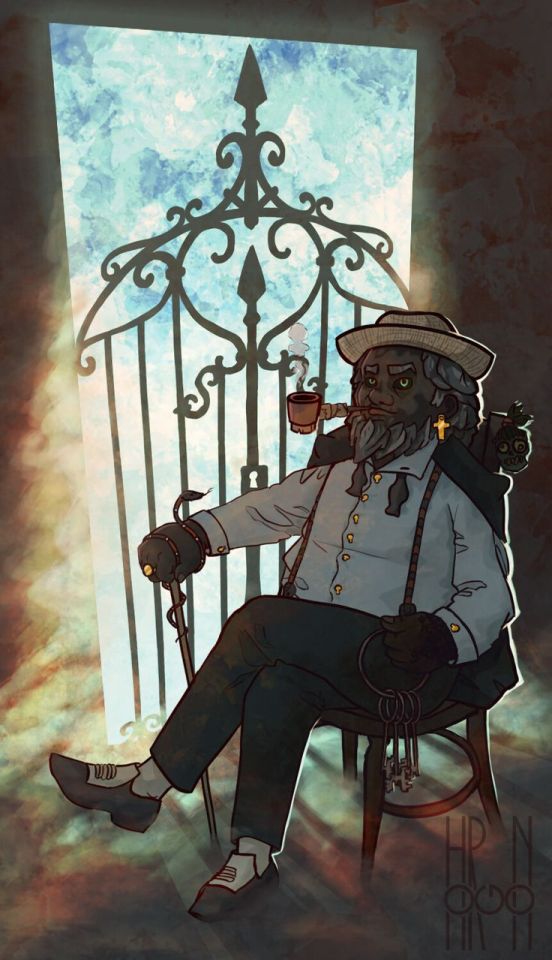
Papa Legba is the Lwa of the gates, he is not a guardian of the crossroads he opens the way to between the worker and the Spirits (Lwa) He stands at a spiritual crossroads and gives (or denies) permission to speak with the spirits of Guineé.
In any Voodoo ceremony Papa Legba is saluted first and he opens the path for communication between the devotees. and is believed to speak all human languages. Within the African Traditional Religion of Voodoo, Vudu, Vodoun, or Vodun, Papa Legba is seen as an old man with a cane or crutch and smokes a pipe. who acts as an intermediary between humans and Lwa. He carries keys and dogs are secret to him
Who he is: Divination Fortune Telling Oracles. He's a deeply revered Lwa who is the voice of Bondye, or God. While he's always saluted first, he does not often mount or possesses. Papa Legba is a protector of children and can be called upon for protection, to open ways, and to bring prophecy. His colors are yellow, purple, red, white and his offerings are alcohol, tobacco in a pipe, bread.

In Catholic syncretic Voodoo practices, Papa Legba is associated with Saint Peter, Saint Lazarus, or Saint Anthony. Papa Legba sometimes associated with the orisha Eleggua from the Yoruban and Cuban Santeria or Lukumi tradition, though Eleggua is seen more of a trickster.
Hoodoo psychic readers, spirit workers, and root doctors who are adherents of the Voodoo Religion and who petition the Lwa on behalf of clients may work with Papa Legba call upon him for protection, to help with communication, especially with other spirits, and to open the roads.
There are many corresponding divisions of lwa, and each has their own Legba tasked with opening the door and allowing those spirits to pass but there’s a good deal of misconception the first thing that's is done is the priye ginen (a prayer and song that blesses and begins all services) in New Orleans a Bible prayer will do) is complete, the first spirit we sing to is Hountor, the lwa of the drums, to translates our modern speech and song into the language of the drums, then the Legba...
But there isn't just one Legba but many... Legba nan Petro, or Legba in the Rada Rite, is the first of the Legba spirits served, and he's task is to open the gate on the Great Road, the doorway that allows the other spirits to come to our celebrations and rites.
For my lineage,( New Orleans) the Rada Legba wears a saint known as Saint Anthony the Abbot.
Legba Nan Petro, the Legba who opens to doorway for the hotter and rougher spirits of the Petro rite. He wears the image of Saint Lazarus (typically an emaciated and sometimes bruised man walking by means of crutches, another symbolic stand-in for the Poto Mitan). Even the nations that make up the components of the larger Rada and Petro rites also have their Legba figures (who may or may not be members of the Legba family of spirits… often times, Ogou Ossange, a wounded healer who is also always shown with crutches, can serve as the Legba nan Nago, or the Legba figure who opens the door for the Nago nation spirits, or the division that holds the spirits of the Nago people, who are now more widely known by the name of their language, Yoruba.) And a misconception is that Kalfou is legbas Twin, he is not. (See post on Kalfou.
The Ghede family, the spirits that are called at the end of every Vodou celebration, also have their own door keepers/Legbas of their group… and are also known for carrying a Baton Ghede, a walking stick that can alternately be a gentlemen’s cane.
In Haitian Vodou, the Legbas are not Crossroads spirits; To us, the Legba figures are the keepers of gates and doors, languages and communication… not the crossroads, which we have as a different being entirely.
As all of us are born with an ability to serve those spirits we inherit or who seek to build relationships with us. ALL of us have access to the Legba spirits, either for opening those doors and forging roads of communication and respect, or for working with the way we would any spirit we serve.
In Haitian Vodou there is a ceremonial protocols, rules, and heirarchies. Not everyone needs to become an initiate to work with their spirits in our religion, just as not all Catholics need to be priests, and certainly one does not need to be a priest to say the Rosary in home prayer… but for transmission of the faith, the services a clergy is required. Vodou is much the same in how it works and functions, and the faithful, while they are capable of small acts of service to their spirits at home,

INVOKING PAPA LEGBA:
Ingredients:
Red CandleBlack Candle3 Coins (of the same denomination) Rum, Cigarettes, Sweets.
Veve of Papa Once you have placed everything on the altar, light everything that needs to be lit, and start to meditate. Once you feel like you are ready, call upon Papa Legba. (Language is no barrier)
You can call him by either singing or reciting his prayer.
Papa Legba open the gate for me. Legba open the gate for me and I will thank the lwa when I return.
Once you feel his presence, ask for his assistance. Talk to him as you would to a friend. He is listening. If you feel that you have opened up as much as possible, you can now ask him to open the door so as to let the spirits or Lwas (Loas) out. Now remember to specifically mention which Loas you want to talk to.
Once you are done talking to him and asking him to open the door, offer him all the items you have laid down on the altar for him. Have some for yourself too. At this point, you should also start the process of invoking the Loa that you with to talk to. This is a whole different ritual all together and each Loa has a different ritual.
Once you are done with the rituals in regards to the Loas, it is time to say Thank You and Good Bye to Papa Legba.
This is done by actually thanking him and saying GoodBye. You should thank him for coming, hearing you out and letting you speak to the Loa, and ask him to close the gate on his way out.
Now that you have completed this ritual, you can pack up all the offerings and take it to a crossroads. You can leave the offerings at the side of a crossroad or under a tree nearby.
#Papa Legba#Voodoo spirits#Legbas spirits#Hoodoo#Spiritual#Ritual#Summoning#Invoking#like or reblog#Subscribe
11 notes
·
View notes